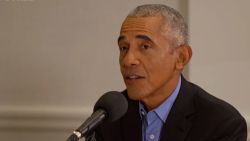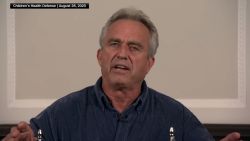Editor’s Note: This story was adapted from the September 18 edition of CNN’s Meanwhile in America, the email about US politics for global readers. Click here to read past editions and subscribe.
As historic protests and a bloody authoritarian backlash convulse Iran, former President Barack Obama has been reflecting on his response to previous uprisings there.
During the 2009 Green Movement protests in Iran, the then-President trod cautiously – to the ire of critics in the Republican Party and abroad – ostensibly because he wanted to avoid giving Iranian authorities an excuse for a brutal crackdown.
In June of that year, Obama did call for free speech, dissent and the democratic process after elections in Iran to be respected and said he was deeply troubled by violence.
But he also had this to say: “It is up to Iranians to make decisions about who Iran’s leaders will be.” He added that he wanted “to avoid the United States being the issue inside of Iran” and becoming a “handy political football.”
Obama later toughened his position, but was accused of pulling his punches to avoid complicating the path to a nuclear deal with Tehran (that he eventually achieved in 2015).
Obama now feels that his initial stance on Iran was wrong, as he explained on Crooked Media’s “Pod Save America” podcast, run by a group of his former White House aides.
“When I think back to 2009, 2010, you guys will recall there was a big debate inside the White House about whether I should publicly affirm what was going on with the Green Movement, because a lot of the activists were being accused of being tools of the West and there was some thought that we were somehow gonna be undermining their street cred in Iran if I supported what they were doing,” Obama said. “And in retrospect, I think that was a mistake.”
“Every time we see a flash, a glimmer of hope, of people longing for freedom, I think we have to point it out. We have to shine a spotlight on it. We have to express some solidarity about it,” he said.
Obama’s comments mark a rare moment of public self-criticism by a former president. But they also show the advantage of perspective that sitting presidents don’t enjoy, since they must make tough decisions on the fly in the heart of crises.
Obama isn’t, however, repudiating his nuclear deal with Iran. Even though it was trashed by his successor, Obama argues that the deal successfully delayed the Islamic Republic’s nuclear development. “Had we not had that in place, I think Iran would’ve had a nuclear weapon by now,” Obama said.
Thirteen years on, President Joe Biden, perhaps informed by his experience in the previous Democratic administration, has been more forceful in quickly supporting Iranian protests. It may also help that his hopes of reviving the Iran nuclear deal are getting more distant by the week.
On Friday, for instance, Biden told reporters that he was “stunned” by the reaction in Iran to the death of Mahsa Amini, the 22-year-old whose death after detention by Tehran’s morality police sparked the latest uprising.
“It’s awakened something that I don’t think will be quieted in a long, long time,” he said.
But while foreign policy partisans in Washington often seem to believe the weight of US words alone – backed up with sanctions – will topple the Iranian regime, things are a lot more complicated.
The US can’t dictate how this turns out. That is as true now as it was 13 years ago. In the end, it’s still up to the Iranian people. And the democratic world can do little more than recognize that flash of hope of people craving freedom.
























